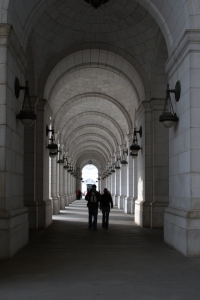

The USPTO remains a farce of a system which strives to assimilate patent offices all around the world to itself. It needs to be stopped or else we will all face the consequences, be those consequences visible or not. A lot of what we buy costs little to manufacture, but since we pay patent tolls prices can be inflated considerably.
Thursday was the hearing on abusive patent litigation by the House Judiciary Committee's Subcommittee on Courts, Intellectual Property and the Internet. By abusive patent litigation, they mean trolls -- or as one calls them when one holds one's pinky genteelly in the air, NPEs, nonpracticing entities. I put out a call for one of Groklaw's own to attend and let us know what happened. Webster was able to attend, and he has provided an eyewitness account for us in his own inimitable style.
The chairman of the hearing, US Representative Bob Goodlatte, opened with a statement, as did several members of the subcommittee with a little speechifying of their own, and then the invited witnesses of the day each told about their company's experiences with abusive litigation, except for one, a lawyer whose firm represents trolls and who opined that the patent system is working well overall. If you click each of the following names of the witnesses, you can download as a PDF the written testimony each provided in advance:
* Mr. Mark Chandler, Senior VP, General Counsel and Secretary, Cisco Systems, Inc. * Ms. Janet L. Dhillon, Exec. VP, General Counsel and Secretary, J.C. Penney Company, Inc. * Mr. John G. Boswell, Sr. VP, Chief Legal Officer and Corporate Secretary, SAS Institute, Inc. * Mr. C. Graham Gerst, Partner, Global IP Law Group, LLC * Mr. Philip S. Johnson, Sr. VP and Chief IP Counsel, Johnson & Johnson * Mr. Dana Rao, VP and Assoc. General Counsel for Intellectual Property Litigation, Adobe Systems, Inc.
As President Obama pointed out in February, the patent reform legislation Congress passed several years ago hasn't "captured all the problems" and the bill "only went about halfway to where we need to go."
"[Patent trolls] are a classic example. They don't actually produce anything themselves," the President said. "They're just trying to essentially leverage and hijack somebody else's idea and see if they can extort some money out of them."
It is important to keep contacting policy makers on this important issue. If you haven’t done so, let the members of the Judiciary Committee in both the House and Senate hear from you. Your voice is important and can make a difference.
Chicago, IL - Room 1040, 10th floor, Power Rogers & Smith Ceremonial Courtroom, Philip H. Corboy Law Center, 25 E. Pearson St., Water Tower Campus, Loyola University Chicago
Motorola has now filed its response to Apple's appeal of Judge Richard Posner's decision to toss out Apple's claims against Motorola (and vice versa), and it adds its own cross appeal [PDF] on the vice versa part -- especially challenging the implication of Judge Posner's ruling that there can be no injunctive relief for FRAND patent owners ever, as a categorical rule.
A blanket denial of the right to seek injunctive relief, Motorola argues, violates patent law, contradicts eBay v. MercExchange [PDF], where the US Supreme Court held that it was error to come up with a categorical rule that “injunctive relief could not issue in a broad swath of cases”, and violates the original expectations of donors of technology to standards bodies. In fact, it says any such rule would violate the US Constitution, which provides that Congress shall have power to secure exclusive rights for inventors, and in the Patent Act Congress came up with, it says every grant to a patentee includes the right to exclude others. Motorola asserts that it has never waived its rights to injunctive relief and states that there is no language in its ETSI agreements requiring it to do so. Motorola argues that there should continue to be a case-by-case analysis under eBay, with judges having discretion to make such decisions based on the particular facts of each case.
Fair warning, though: the PDF is 737 pages. The actual brief is one-tenth that, 73 pages, so I've done that part of it for you as text. The rest is a collection of patents at issue, judge's orders in this case, and one from a related Apple v. Motorola litigation in Wisconsin, which is where this case began, before being transferred to Illinois and Judge Posner.
The Samsung Galaxy S4 possibly uses a new type of eye-tracking software that LG believes violates one of its own patents.
LG on Tuesday claimed that its South Korean competitor may have violated the company’s patent which pauses video clips when a user turns their head away from the video they are watching.
During the Samsung Galaxy S4 event last week the company announced the new feature as one of the smartphones best new options.
Samsung however was very clear in stating that it does not actually use eye-tracking technology but rather facial recognition software.
The Wall Street Journal reports that patent holding company Intertrust Technologies Corp. has filed suit against Apple, accusing the Cupertino-based company of infringing on 15 of Intertrust's patents related to "security and distributed trusted computing."
Comments
NotZed
2013-03-21 11:51:40
Naah, you just need cash. Lots and lots of cash. It doesn't matter what name or which qualification it's attached to.
Corruption, plain and simple.